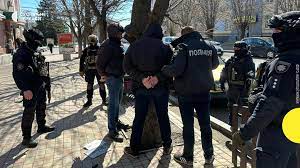I constantly strive to develop and acquire new knowledge, my experience and additional education confirm this.
Extortion can refer to various situations where a person demands the performance of certain actions or non-performance, threatening another person with danger, harm or other negative consequences in case of non-fulfilment of the demand.
Extortion can be a crime if it is accompanied by threats, violence, blackmail or any other illegal actions in order to force another person to fulfill certain requirements.
For example, ransom demand is when the criminal demands a sum of money from the relatives or loved ones of the person for the hostage's vacation. This is a serious criminal act punishable by law.
Part 1 of Art. 189 of the Criminal Code, which provides for responsibility for demanding the transfer of someone else's property or the right to property, as well as for demanding the performance of any actions of a property nature with the threat of violence against the victim or his close relatives, restriction of the rights, freedoms or legal interests of these persons, damage or destruction their property or property in their care or custody, or disclosure of information that the victim or his close relatives wish to keep secret (extortion).
According to this part of the article, for demanding the transfer of someone else's property or the right to property, or committing any actions of a property nature with the threat of violence, restriction of rights, freedoms or legal interests, damage or destruction of property, or disclosure of information that the victim wishes to keep in secrets, liability is provided in the form of restriction of liberty for a term of up to five years or deprivation of liberty for the same term.This article applies to cases where a person demands certain actions or the transfer of property with the threat of violence or other negative consequences. Such actions are considered a serious violation of the law and may be punished according to the law.
A more severe punishment for extortion committed repeatedly, with a prior conspiracy by a group of persons, or by an official using his official position, or with the threat of killing or inflicting serious bodily harm, or with damage or destruction of property, or that caused significant damage to the victim. These actions are punishable by imprisonment for a term of three to seven years.
Part 3 of Article 189 of the Criminal Code provides for even more severe punishment for extortion combined with violence that is dangerous to a person's life or health, or that has caused large property damage. Such actions are punishable by imprisonment for five to ten years with confiscation of property.
This Article 189 of the Criminal Code applies in cases where extortion is accompanied by violence that is dangerous to the life or health of a person, or when the property damage caused is great.
Property confiscation can also be applied in such cases with the aim of depriving the criminal of his illegal profits and compensating the victim. This punishment is intended to prevent serious criminal acts that can cause significant harm to individuals and society.
Part 4 of the above-mentioned article provides for even more severe punishment for extortion, which caused property damage in particularly large amounts, or was committed by an organized group or in conditions of war or state of emergency, or combined with causing serious bodily harm.
Such actions are punishable by imprisonment for seven to twelve years with confiscation of property.
It is used in extremely serious situations where the extortion has resulted in extensive property damage, especially large-scale, or is committed by an organized group or in a state of war or emergency. Also, if the extortion is combined with the infliction of grievous bodily harm, this leads to an increase in the punishment.
Property confiscation can be used to deprive the criminal of his illegal profits and to compensate the victim. This punishment is intended to deter serious criminal acts that can cause significant harm to individuals and society.
If you need legal help regarding Article 189 of the Criminal Code of Ukraine or any other matter, a lawyer can provide you with professional advice and support. By contacting a lawyer, you will be able to receive an individual consultation that will take into account your specific situation and provide recommendations on further actions.





























